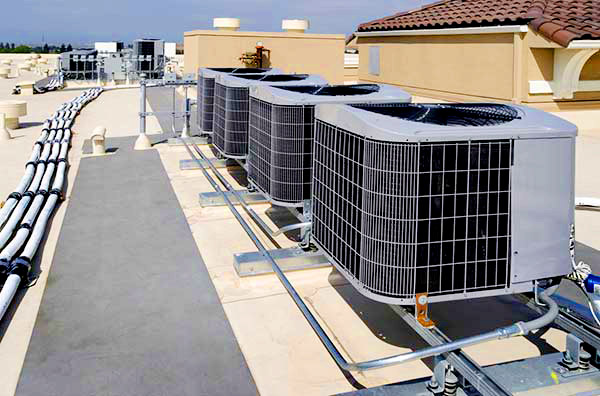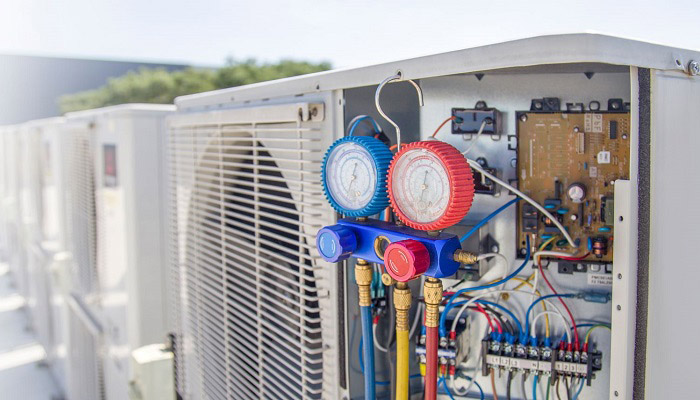Commercial HVAC Repair
Whether you’re dealing with inconsistent temperatures, rising energy bills, or a complete system breakdown, prompt and professional commercial HVAC repair is key to maintaining a comfortable indoor environment. This pillar page covers everything you need to know about commercial HVAC repair, from signs it’s time to call for service to how to find the right provider “near me.”
Why Commercial HVAC Repair Matters
A well-maintained and fully functional HVAC system is essential for any commercial building—be it an office complex, retail space, or industrial facility. When your HVAC unit struggles to maintain comfortable temperatures, it impacts employee productivity, customer satisfaction, and even your bottom line. Proper repair work ensures:
-
- Consistent Indoor Climate: Keeps temperature and humidity levels stable.
- Energy Efficiency: Prevents unnecessary energy consumption and high utility costs.
- System Longevity: Extends the life of your HVAC equipment and reduces the frequency of breakdowns.


Signs You Need HVAC Repair
- Inconsistent Heating or Cooling
If certain areas of your building feel significantly warmer or cooler than others, it often indicates that your HVAC system isn’t distributing air properly. - Unusual Noises or Odors
Clanging, rattling, or strange odors coming from your vents or equipment can signal mechanical issues, duct problems, or mold growth. - Spiking Energy Bills
Sudden increases in utility costs may be due to inefficiencies in your HVAC system. A quick repair could resolve minor issues before they turn into major expenses. - Reduced Airflow
Weak or restricted airflow might point to a failing blower motor, clogged filters, or blocked ductwork. - Frequent Cycling
Systems that turn on and off too often may have a malfunctioning thermostat, improper refrigerant levels, or sizing issues.
Common Commercial HVAC Repair Services
- Compressor or Motor Repairs
The compressor and motors keep the system running. Faults here can cause your entire HVAC unit to shut down or run inefficiently. - Refrigerant Leak Detection and Recharge
Low refrigerant leads to reduced cooling capacity, and leaks can harm both the system and the environment. - Thermostat Calibration and Replacement
A malfunctioning thermostat can cause wide temperature swings and wasted energy. - Electrical Component Repairs
Blown fuses, worn wiring, or faulty relays can disrupt the power supply, shutting down your system or causing erratic performance. - Fan and Blower Assembly Repair
Fans circulate air throughout your facility. Damaged blades or belts will reduce airflow and comfort.
Choosing a Commercial HVAC Repair Service “Near Me”
When your system breaks down, you need a fast, reliable, and local solution. Searching “commercial hvac repair near me” is the first step to finding a nearby contractor who can respond quickly. Here’s what to look for:
- Prompt Response Times: A reputable contractor offers 24/7 emergency services or same-day appointments.
- Certified Technicians: Confirm that the team has the proper certifications and training for commercial systems.
- Transparent Pricing: Look for clear estimates before work begins, so you’re never caught off guard by hidden fees.
- Positive Local Reputation: Check reviews and testimonials from other businesses in your area.
- Preventive Maintenance Options: Many reliable HVAC companies offer ongoing service plans to keep your system in peak condition year-round.
How the Repair Process
Typically Works
- Initial Inspection
A certified technician arrives on-site to evaluate the condition of your HVAC system, locating any underlying problems. - Diagnostics and Recommendations
After identifying the issue, the technician explains your repair options, estimated costs, and timelines. - Repairs and Part Replacement
Components are repaired or replaced as needed. This might include swapping out belts, cleaning the coils, or fixing electrical connections. - Testing and Calibration
Once the repair is complete, the technician tests the system for proper operation and adjusts settings to ensure optimal performance.
Post-Repair Maintenance
A follow-up plan or a preventive maintenance schedule helps you avoid similar issues in the future.
Preventive Maintenance and Long-Term Savings
Regular HVAC maintenance is one of the best ways to prevent costly repairs. Proactive measures like filter changes, coil cleaning, and routine inspections can catch minor issues before they turn into major breakdowns. In the long run, a well-maintained system will:
- Operate more efficiently, lowering energy costs
- Last longer, reducing capital expenditures
- Maintain consistent temperatures, boosting comfort and productivity
Preventive Maintenance and Long-Term Savings
Q: How often should I schedule commercial HVAC maintenance?
A: Most experts recommend twice per year—once before the cooling season and once before the heating season.
Q: How can I tell if I need a repair or a full replacement?
A: If your system is more than 10-15 years old, frequently needs repairs, or struggles to maintain temperature, a replacement might be more cost-effective. Consult a professional for an assessment.
Q: Are commercial HVAC repair services available 24/7?
A: Many companies offer emergency support. Always check for after-hours services or weekend availability in your area.
Q: Does location matter when choosing an HVAC repair provider?
A: Yes. Choosing a local HVAC contractor simplifies logistics, leads to faster response times, and ensures familiarity with local regulations and climate conditions.
Take the Next Step
If you’re experiencing any of the common signs that indicate you need commercial HVAC repair—like strange noises, rising energy bills, or inconsistent temperatures—don’t wait. Timely repairs help you avoid more extensive damage and keep your business running smoothly.
Ready to schedule a repair or learn more about our services?
Contact our team today. We’ll send an experienced commercial HVAC technician to diagnose and fix the problem, getting your system back up and running in no time.
Proactive commercial HVAC maintenance is the best strategy for preventing system failures, ensuring energy efficiency, and extending the life of your equipment. With routine check-ups, you’ll keep your facilities comfortable year-round and save money in the long run.
